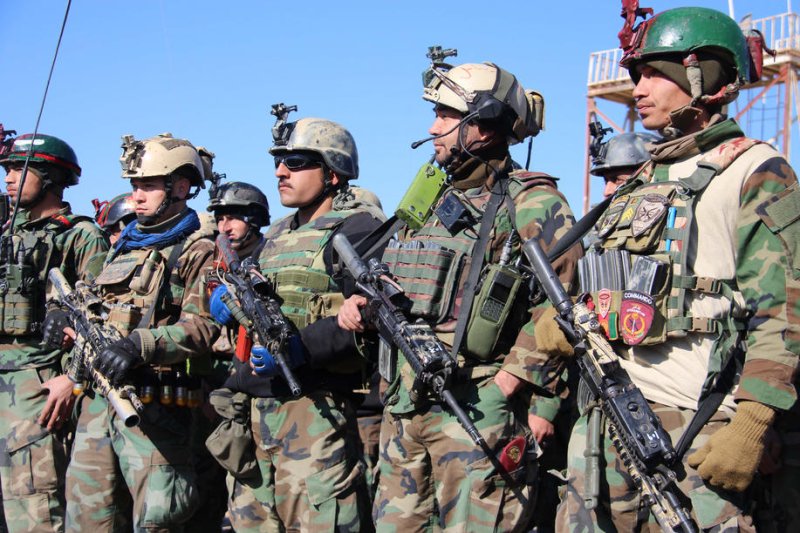Mideast leaders arrive in Qatar to sign U.S.-Afghanistan peace deal
THIS IS WHAT AMERICAN VICTORY LOOKS LIKE IN AFGHANISTAN
NOT WITH A BANG BUT WITH A WHIMPER
AN IGNOBLE DEFEAT BY ANY OTHER NAME WOULD SMELL AS SWEET

Afghan soldiers man a checkpoint in Helmand, Afghanistan, on February 22
at the start of a seven-day "reduction in violence" agreement between the
United States and the Taliban. Photo by Watan Yar/EPA-EFE
Feb. 28 (UPI) -- Foreign leaders arrived in Qatar Friday to prepare for a peace agreement that will end nearly two decades of U.S. military involvement in Afghanistan.
Foreign ministers of seven nations and representatives from 50 others are expected to attend the signing ceremony in Doha on Saturday. The ratification of the deal is dependent on a successful conclusion of a week-long partial truce this week.
Saturday's signing is scheduled to occur at the Taliban's Doha headquarters. The dignitaries began arriving Friday. U.S. Defense Secretary Mark Esper and NATO Secretary-General Jens Stoltenberg will visit Kabul Saturday to announce a joint peace declaration with Afghan President Ashraf Ghani.
"Tomorrow is a big day for Afghanistan and for Afghans. It's a great opportunity," Pakistani Foreign Minister Shah Mahmoud Qureshi said. "Afghanistan is moving towards peace and reconciliation. So, tomorrow can set the tone for an inclusive intra-Afghan dialogue."
Feb. 28 (UPI) -- Foreign leaders arrived in Qatar Friday to prepare for a peace agreement that will end nearly two decades of U.S. military involvement in Afghanistan.
Foreign ministers of seven nations and representatives from 50 others are expected to attend the signing ceremony in Doha on Saturday. The ratification of the deal is dependent on a successful conclusion of a week-long partial truce this week.
Saturday's signing is scheduled to occur at the Taliban's Doha headquarters. The dignitaries began arriving Friday. U.S. Defense Secretary Mark Esper and NATO Secretary-General Jens Stoltenberg will visit Kabul Saturday to announce a joint peace declaration with Afghan President Ashraf Ghani.
"Tomorrow is a big day for Afghanistan and for Afghans. It's a great opportunity," Pakistani Foreign Minister Shah Mahmoud Qureshi said. "Afghanistan is moving towards peace and reconciliation. So, tomorrow can set the tone for an inclusive intra-Afghan dialogue."
RELATED Over 20 GOP lawmakers seek assurances on U.S.-Taliban deal
U.S. forces have been in Afghanistan since late 2001 after the terrorist attacks in New York City and Washington, D.C., and President Donald Trump for months has indicated a desire to withdraw American troops.
"We want very much to be optimistic first, and, secondly, of course we welcome the peace process," added Uzbekistan Foreign Minister Abdulaziz Kamilov. "Uzbekistan is immediate neighbor of Afghanistan and over the past many centuries, we had very close humanitarian culture, economic ties with Afghan people."
The peace deal is seen by the United States as a precursor to the more challenging prospect of direct talks between the Taliban and the U.S.-backed Afghan government, which was not involved in the truce negotiations.
RELATED Pompeo: United States will sign Taliban deal if violence pact holds
Under terms of the deal, the U.S. military will begin a phased withdrawal and the Taliban will start negotiating with the Afghan government, which has always refused to recognize a permanent cease-fire or a power-sharing structure. The format and details of the future talks have not been finalized, but analysts say they could be complicated by division between Ghani and Afghan chief executive Abdullah Abdullah over certain issues.
SEE https://plawiuk.blogspot.com/search?q=HARPERS+WAR
SEE https://plawiuk.blogspot.com/search?q=AFGHANISTAN
No comments:
Post a Comment